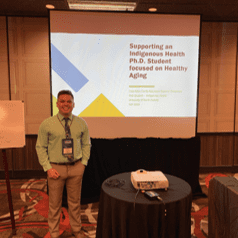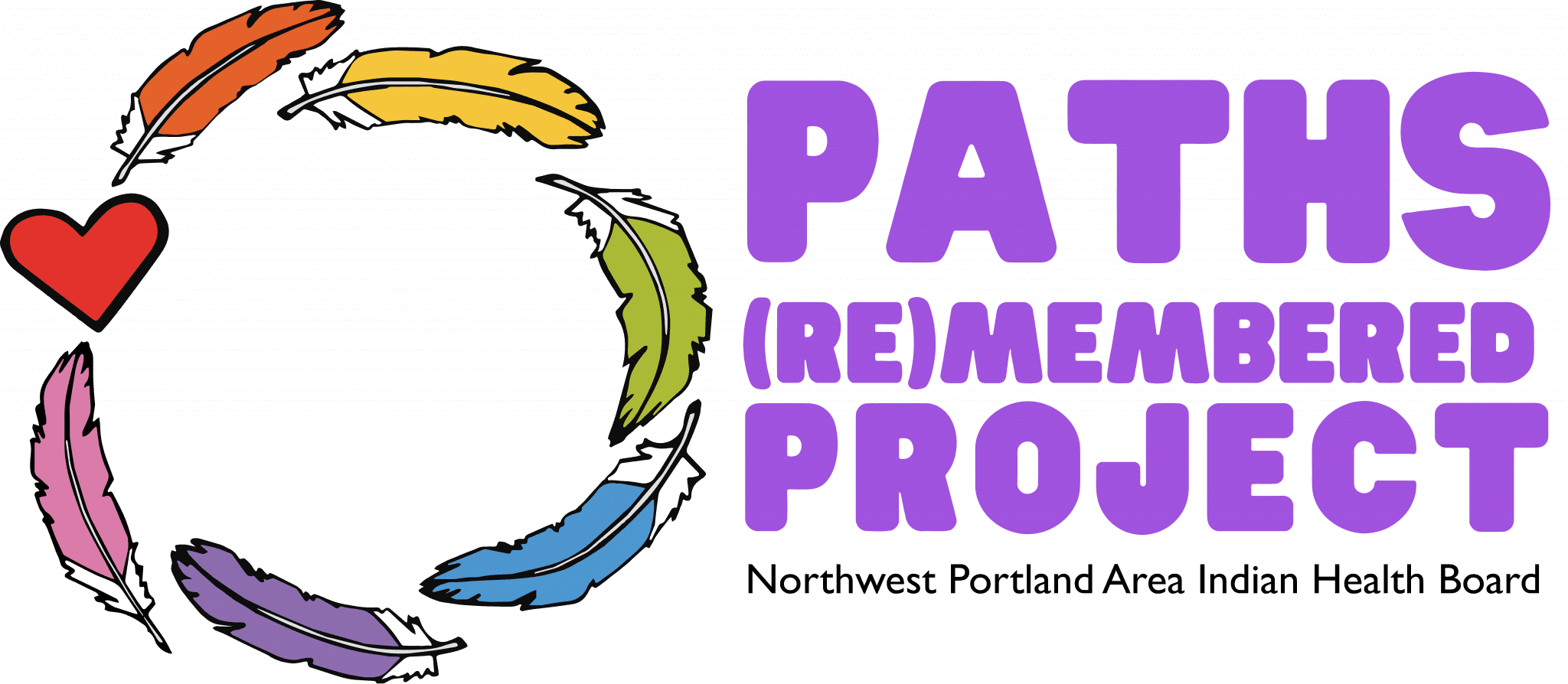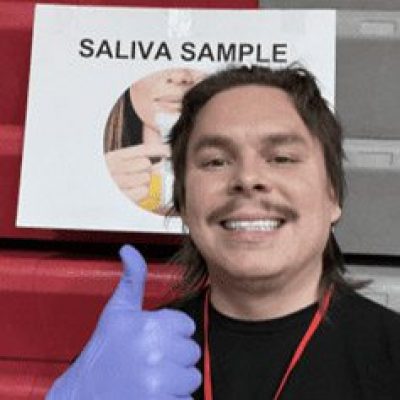Could you introduce yourself to our readers?
Sure. My name is Cole Allick. I’m a Two Spirit researcher and tribal citizen of the Turtle Mountain Band of Chippewa Indians. My family’s back home in Belcourt, North Dakota. I’m a guest here in Seattle, working for Washington State University.
Congrats on finishing your dissertation! I wonder if you could tell us about your personal journey through that dissertation and why you chose to think about elders within that work.
I think when people picture dissertation writing, they often picture this giant book or a person in a library or professors running around in cloaks. But for me, there was so much personal growth that went into my dissertation writing.
Through grad school, I worked full-time and went to school full-time. And part of my work was an Alzheimer’s Project, so I was immersed in literature around Alzheimer’s and elders. I started writing my papers for school on Alzheimer’s disease. It helped me juggle working full time, so I could have the money to survive, and going to school. I basically stumbled into Alzheimer’s research. Then we had a presentation in class from an Indigenous advocacy group, and I introduced myself and said I was interested in working with elders and Alzheimer’s. The presenter reached out afterward to my professor and said, We don’t hear a lot of young Native people interested in working with elders and Alzheimer’s. Most of us in this field are older. That seemed like a sign. Then, that April, my grandma passed, which just underscored everything. From all directions, I was being guided—Go this route, take this route.
Through a series of informal conversations, I stumbled upon the National Indian Council on Aging and got an invite to their annual conference to present and collect some data. I got money from my boss at work to give gift cards to the elders, and I did a breakout session, a listening session focused on cognitive impairment and Alzheimer’s disease. It was really a community conversation, because that’s missing from the literature. A lot of people are trying to address Alzheimer’s, but nobody’s going to our elders and talking to them about it. They’re saying, let’s change the healthcare system. Let’s come up with this resource. Let’s do these things. No one’s actually talking to our elders about what it means to age in a healthy way and what they need.
Looking back on it, it seems like it all fell together perfectly, but it never felt that way. It felt like surviving, trying to get through the week, trying to get through that class, trying to get through that wave of grief that makes you not want to get out of bed. But like a lot of good grandmas and aunties even through the spirit world they come through. When they tell you to get your butt up that message rings clear.
As you look forward, do you see yourself continuing to work with elders? Do you have interest in working specifically with Two Spirit elders as well?
The short answer is—Yes, absolutely.
I think a lot about our Two Spirit elders, about the importance of being Two Spirit. The way it was explained to me when I got my spirit name was that it meant there were all these important things to live up to. It’s difficult to fund work with Two Spirit elders, because the funding agencies look at it like a sub-population of a sub-population of a sub-population. So now my focus shifts to think about how I challenge that system. Just because there are fewer Two Spirit elders doesn’t mean there’s any less value in doing this work with them. There’s something to be learned in every room. Whether it’s a room of 100 people or 38 people, there’s power in that story.
And I’m excited to hopefully grow into a Two Spirit elder myself, which requires taking care of myself and taking the time to heal properly from being in the academy while working full time. So it’s also a personal goal.
As you look to the future of Two Spirit and Indigiqueer research, what challenges do you see, and what excites you?
I’m a cis-, white-, hetero-passing person. I’m afforded that benefit. I’ve sat in rooms where people have said some really messed up stuff, thinking they’re in a room full of white people. Now that my hair’s a little longer, people look at me funny in academics. Little things like that excite me, poking at people a little bit. Not trying to get a rise out of people for the sake of getting a rise, but seeing what the world looks like when you’re unapologetically yourself.
I was fortunate enough, honored really, to be the first graduate of my program, which is the first Indigenous health PhD program in the world. That’s something to live up to. For my dissertation presentation I invited everyone. My family. My friends. Over 100 people were at my dissertation defense. I made it inclusive, accessible to everyone. Some academics would say, That’s not what you do. To that, I say, I did your thing and I did it better. That dissertation presentation was the first time in three years I was definitively calling myself a Two Spirit researcher. Period.
That excites me, being unapologetic in the academic space, because I’ve played their game. They can’t take away my PhD. They can’t tell me I don’t fit in anymore, because I did what they said I needed to do. And I did it in a way that strengthened my identity and strengthened my roots and strengthened my spirit. And made my hair longer.
What would a liberated Two Spirit and Indigiqueer research look like?
One of my mentors at my job passed away unexpectedly, very young, from colorectal cancer, and for a while afterward I felt really lost. Lost in this grief I couldn’t escape, in this loss I couldn’t escape. She was one of the few native PhDs in the world. None of us are safe. After her loss, there was this really intensive environment in the organization, which caused a lot of lateral violence between some non-native people I worked with. That made me feel even worse. And in that moment I decided that all I care about in any institution where I’m working is to build a little rez house. I just want my space to be this beautiful rez house where the door’s never locked and there’s dogs running around and you can come in and talk about whatever you need to talk about, whether it’s personal or professional, and if you need someone to gas you up, you know, the coffee is always on. A space that reminds me of home, that doesn’t have rules about who is family and who isn’t.
I’ve carried this open door policy since then, and people are starting to recognize it, to approach me. So when I think of Indigenous research, I think, If you build it, they will come. And we’ll find each other.



